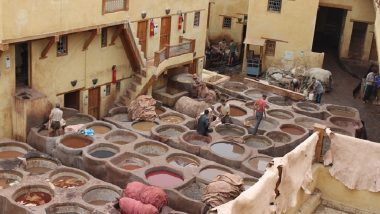Kanpur, December 24: The Maha Kumbh in Allahabad starting next month could spell trouble for lakhs of workers, tanners, and meat and leather exporters in view of the Uttar Pradesh government's order to close tanneries and meat factories in Kanpur and Unnao for three months during the congregation. The state government has ordered the closure of tanneries between December 15 and March 15 in the cities of Kanpur and Unnao to provide clean water to devotees participating in the upcoming Ardh Kumbh festival.
The Kumbh Mela is to be held in Allahabad between January 15 and March 4, 2019. According to the Uttar Pradesh State Industrial Development Corporation (UPSIDC), 264 small and big tanneries operate in Kanpur and Unnao. Ardh Kumbh Mela 2019: Images of Naga Sadhus, ‘Kumbh Chalo’ Slogans to Adorn 1,600 Rail Coaches Run by Indian Railways Specially for the Holy Event.
Those in the business say these tanneries are the primary source of income and livelihood for over one lakh families. "Small-scale tanneries are likely to be the worst affected by the government's order," says the owner of one of the smaller units. Taj Alam, the president of the UP Leather Industries Association (LIA), told PTI the state government's move has come as a shock for the leather industry and meat processing units which are already in the red. No Marriages in Prayagraj for Three Months! UP Govt Bans Wedding Ceremonies in Prayagraj Between Jan-March 2019 for Upcoming Kumbh Mela.
Alam said the complete closure of tanneries could spell trouble for over three lakh workers who hail from socially and economically backward community and are engaged in the industry. The leather and leather goods export business and domestic sales from Kanpur and Unnao is around Rs. 2,000 crore a month each and the complete closure would hit business worth over Rs. 12,000 crore, Alam feared. "There will be large-scale job loss if the ban is not revoked."
He said he has apprised top officials of the Union Commerce Ministry about the past practice of closing tanneries just for three to four days at a time before the days assigned for the 'shahi snan' (holy bath). The meat processing industries which are mostly in the Unnao district would also be affected as it would not be able to dispose of hide and other byproducts if the tanneries remained closed, he said.
Unnao district has seven meat processing units with a combined annual turnover of Rs 10,000 crore. The winter days are its peak season and the ban on tanneries will seriously hit the meat export business. Alam said the effluent released from tanneries into the Ganga may not be even half as polluting as the untreated water released from various towns along the river.
The tanners treat the water thrice before releasing it into the river, Alam said, adding the water from the plants is diverted to Rai Bareli and 80 per cent of the waste water does not reach the Ganga and this has been shown in the inquiry report made jointly by top administrative and and irrigation department officials of Unnao district just a fortnight back.
Alam claimed that the Union commerce ministry has written to the UP chief secretary advising against the three-month ban on tanneries and meat units, which it feels is illogical as the holy bath takes place only on certain days.
Regional Officer pollution control board (PCB), Kuldeep Mishra, however, denied claims of complete closure of tanneries in Kanpur. To be precise, 249 tanneries have been asked to operate at 50 per cent of average capacity, he said.
Mishra said that last month Jal Nigam officials expressed their inability to treat the waste released from tanneries by the central effluent treatment plant.
After this, the PCB decided not to allow tanneries to operate during Kumbh, Mishra said. A couple of weeks later, Jal Nigam apprised the board it can treat wastes released by tanneries if they operate at 50 per cent of their capacity. So, the tanneries have been ordered to work at 50 per cent of their average capacity.
He said that even though Kanpur tanneries will keep on working at reduced capacity, a hundred per cent closure of tanneries will occur in Unnao. This is because CPT is unable to process the effluent produced by the tanneries there. Chairman of the Council of Leather Exports Mukhtarul Amin too said the government's decision will have an adverse impact on the leather industry.
"If this happens, it will be impossible for us to get back into the leather business," he said.
Amin said the government should act swiftly to avoid consequences. "Pakistan and Bangladesh will earn the larger share in global leather exports," he said. Taj Alam added, "The leather and allied industries are already in a loss and global exporters have started terming India as an unreliable market. In conditions like these, the industries will either shut down or move to different states and this will affect us very badly."
As per data provided by the Council for Leather Exports, the export of leather and leather products for the financial year of 2017-18 touched Rs 9,153.321 crore, as compared Rs 9,624.193 crore in 2016-17, which recorded a negative growth of 4.89 per cent. India's leather industry accounts for nine per cent of the world's footwear production, and 12.93 per cent of the international production of hides/skins.
These tanneries were once the biggest exporters of finished and unfinished leather in the international market, however, 154 tanneries have been shut down since 2016 due to excessive water pollution or illegal functionality. To maintain the treatment plant, the government recently provided Rs 17 crore to the Uttar Pradesh Jal Nigam (UPJN), according to the UP Minister for Export Encouragement, Satyadev Pachauri.
According to the PCB, waste water coming out from tanneries is first treated at the chemical plant in Jajmau, after which the treated water is sent into the Ganga. The water is considered not fit for consumption, but the treatment makes it fit to be sent into the river. There are nine points in the treatment plant from where the water is released into the river.













 Quickly
Quickly


